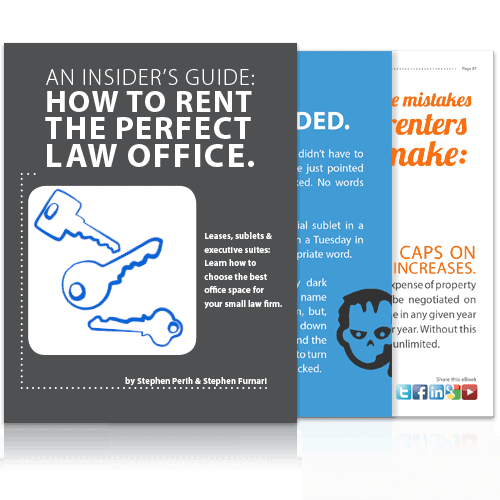Know these 5 things about your law practice before choosing shared office space and find the best balance of flexibility and stability for your firm.
This is the second day of our Finding the Perfect Law Office month. And we’re going to keep the ball rolling with 5 things that you must consider before renting shared office space.
- Tuesday: A free eBook “The Insider’s Guide: How to Rent the Perfect Law Office”– (52 page, full color PDF)
- Thursday (today): 5 Things Attorneys Must Consider Before Renting NYC Law Firm Office Space
- Saturday: Sublet Office Space: Why NYC Law Firms Don’t Make Good Landlords
- Sunday: (Attention Lawyers) Don’t Rent from Executive Suites Until You Read This
- Saturday: How Big Should a Law Firm Get Before Considering their Own Leased Office Space?
Moving a law office always results in lost billable time.
As a practitioner, I tried to not move my firm’s office more than once every five years. But this can be tricky.
For many attorneys, your practice will likely to change a lot in five years. Finding an office space that has that perfect mix of flexibility and stability can be difficult.
Doing so requires having a solid understanding of these five things.
1. How much will your firm grow (or contract) over the next five years?
Give some careful thought about how you want your firm to change over the next five years.
Are you an immigration attorney with ambitions to scale up with 10 paralegals? Do you expect to find a partner for your commercial litigation practice and hire one or two associates? Or, does success for you mean keeping things small and manageable, but maybe hiring a part-time bookkeeper to do your billing?
Change doesn’t always mean growth either. If you are thinking about retirement, going in-house or getting out of the practice altogether, take that into consideration as well.
If you have any ambition to expand or contract your practice from where it is now, you will need a space that is flexible enough to accommodate the change, but stable enough that you won’t have to move short term.
For example, office spaced leased directly from a landlord offers the most stability but the least amount of flexibility. With a long term office lease, you are guaranteed to not have to vacate the office for a while, but if there is no extra space available in the building when the firm needs it, the firm could end up with staff in two buildings.
The lack of flexibility in a long term lease often results in firms taking on (or ending up with) more space than they need.
Try to sublet that extra space to offset the cost and you could have a whole other headache on your hands. For this reason, most self-employed attorneys opt for shared law office space as opposed to direct leases.
We’ll be talking about law firms subletting extra office space on Saturday in the article “Sublet Office Space: Why NYC Law Firms Don’t Make Good Landlords”.
2. Which working environment will make you most productive?
Your physical workspace can make a meaningful difference in your productivity. Some attorneys thrive off the buzzing energy of a busy office. Others want to work in an office that feels like a law firm: professional and quiet, but not dead.
Give some thought about the different features in your current (or past) office that helped you be most productive. Was the culture collaborative? Sterile? Quiet? Were people friendly or did they stick to themselves? What was your office like? How much space did you have? How did it feel, was it roomy or cramped?
When selecting an office for your firm, we suggest that you consider the following items, which are listed in priority order:
- Building location. Look for something that is not only convenient to you, but also your clients.
- Your physical workspace. You can sublease office space in the nicest NYC building, but if your work-space is a hovel, then you will not be happy or productive.
- The conference rooms. Next to your office, you’ll probably spend the most time in conference rooms. Make sure they will meet your typical needs, and more importantly, will be available when you need them.
- The office suite, including reception. If you had to choose between a workspace that makes you happy or a reception area with designer chairs and modern art, go with the former. An office suite that is “nice enough” will not prevent you from retaining clients, but will also not make the client think that your rates are inflated to pay for the designer furnishings.
- The building lobby. Most buildings where NYC shared office space is located have decent lobbies. The market simply demands it. Frankly, the threshold for building lobbies is that there should be nothing offensive about it (odors, disrepair, etc.). That’s a low bar.
- The building exterior. Frankly, for attorneys the exterior design of the building is irrelevant. The only people who look up in Manhattan are tourists and architects. No client will refuse to retain your firm because of what the exterior of your office building looks like.
3. What’s your real budget?

But if you are choosing between an office that you really like but that stretches the budget, or one that doesn’t get you excited but is within the budget, go with the bigger office (within reason, I’m not advocating irresponsibility).
Time and time again we’ve seen that attorneys who take the nicer space play a “bigger game”. As compared to their colleagues who play it safe, the attorneys who stretch not only find a way to pay for the extra expense, but they grow their practices much more rapidly.
So, as you figure out your budget, come up with a range the high point of which may be a stretch for you. Then go shopping for space.
4. What services must your practice have?
Once you know your budget, think about all the services your firm needs as part of your office (internet, phone service, copy machines, reception services, HVAC, cleaning, kitchen pantry, etc.). It’s best to group these services into three categories:
- What you absolutely require.
- What would be nice to have.
- What you can definitely live without.
When looking at different office options, in order to compare “apples to apples” you need to really understand what is included as part of the deal. If the services your firm absolutely requires are not included (or are inadequate), then you will have to pay for these things on your own. One or two of these items can significantly increase the cost of your law office rental.
For example, take your typical NYC shared office space. In many executive suites, Internet is included as part of your rental fees. Executive suites, being in the business of renting space, tend to have high-end internet service.
Internet service is usually included as part of the deal in sublet office space as well. But it will only be as good as what the sublessor is willing to purchase. If you’re planning to run your firm from the Cloud, a slow internet connection will not only reduce productivity, it may make you crazy. You’ll soon be finding yourself purchasing a $700 per month T1 service.
In the Insider’s Guide, we discuss all the hidden and overlooked cost in the most common office spaces available for lawyers.
5. What kind of people do you want around you?
Law is a profession that is most successfully practiced in collaboration with other lawyers. The ability to brainstorm and get advice about legal issues or practice strategies is essential to everyday practice.
Your firm may be big enough to have this collaborative environment on its own. Maybe you just don’t care to be around other lawyers. For the rest of us, it makes the most sense to find shared office space.
But who you find in a shared office space may be a mixed bag.
In a typical Manhattan law office sublet, you may find lawyers who are open to collaboration. These are typically office situations where there are a number of small law firm subtenants. What’s more common though is sublessors who simply want you to pay timely and leave their attorneys alone so they can bill.
Executive suites can be a more collaborative environment, but unless you rent from an executive suite for law firms, you may find an odd mix of clientele ranging from traders to tailors. Different professionals have different work habits that don’t always lend well to sharing space attorneys, who require quiet and, above all, privacy.
We secret shop our competitors often and in the Insider’s Guide to Renting the Perfect Law Office, we’ve shared some of the astonishing things we’ve witnessed.
Your Turn
Two questions for you…
1. Have you considered all of these five items for your next move?
2. Are you interested learning more about how to make your office space profitable? Download The Ultimate Guide to Maximizing Referrals in Shared Law Office Space, no charge.
Thank you for reading, I’ll see you down in the comments! And don’t forget to come back to read the remaining 3 posts from Finding the Perfect Law Office month.
 Stephen Furnari is a corporate attorney and the founder of Law Firm Suites, an executive suite for law firms based in New York City. Through Law Firm Suites, Furnari has helped dozens of attorneys launch and grow successful law practices. He is the author of several eBooks, including “7 Deadly Mistakes that Prevent Law Practice Success” and “An Insider’s Guide to Renting the Perfect Law Office”. Stephen has been featured in the ABA Journal, Entrepreneur, New York Daily News and Crain’s New York. You should follow Stephen on Twitter.
Stephen Furnari is a corporate attorney and the founder of Law Firm Suites, an executive suite for law firms based in New York City. Through Law Firm Suites, Furnari has helped dozens of attorneys launch and grow successful law practices. He is the author of several eBooks, including “7 Deadly Mistakes that Prevent Law Practice Success” and “An Insider’s Guide to Renting the Perfect Law Office”. Stephen has been featured in the ABA Journal, Entrepreneur, New York Daily News and Crain’s New York. You should follow Stephen on Twitter.
photo credit: Alastair Montgomery via photopin cc


